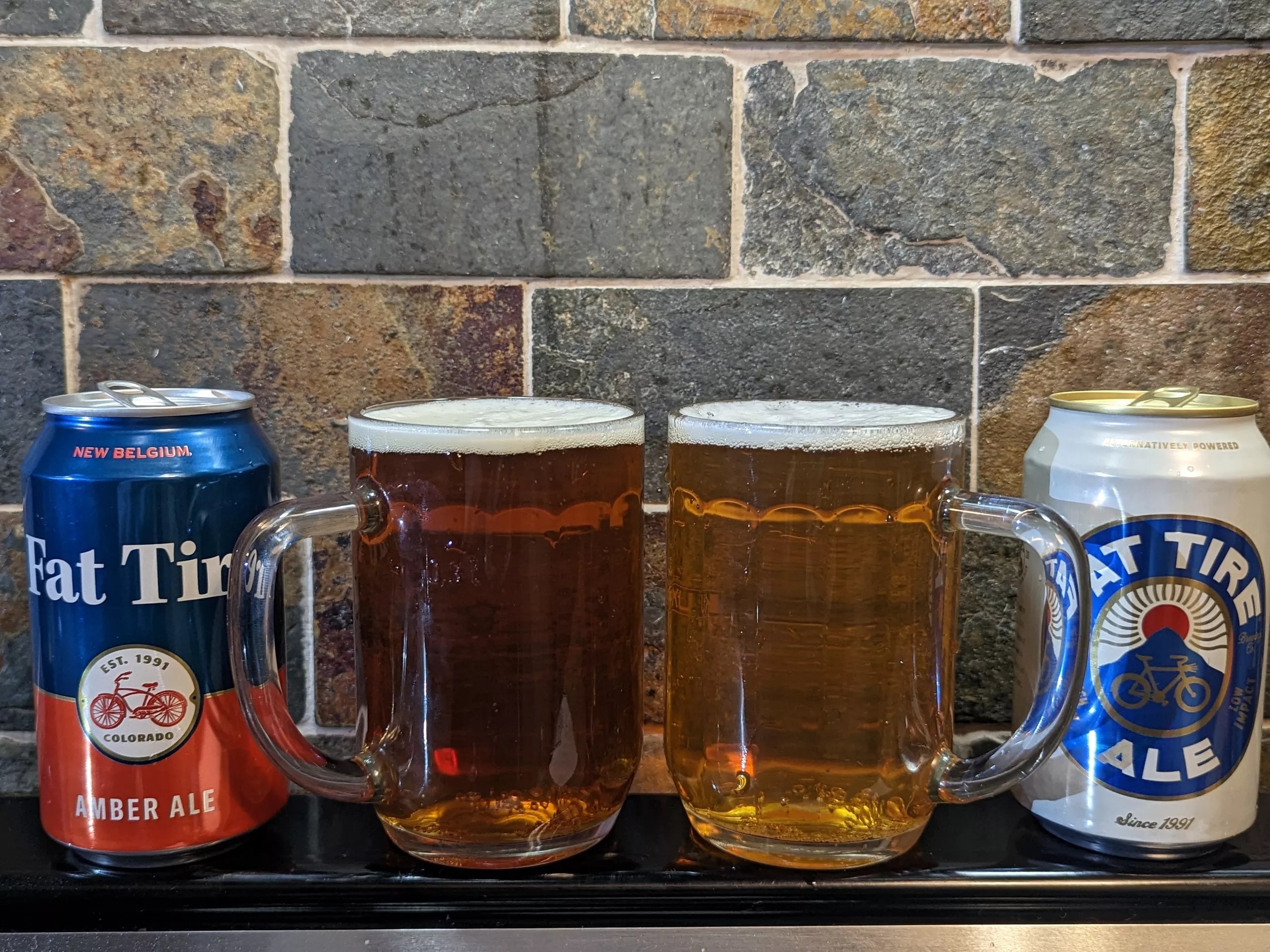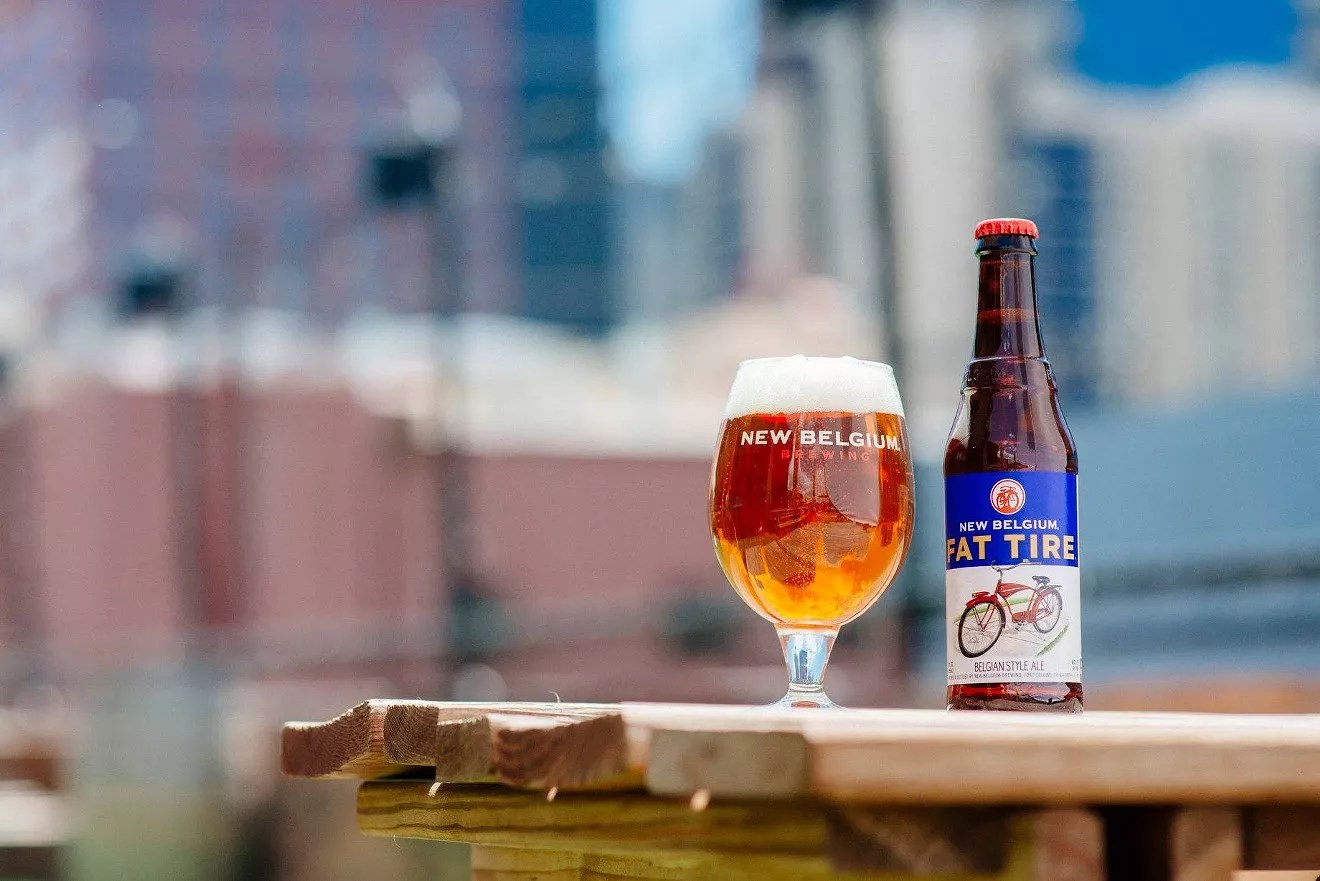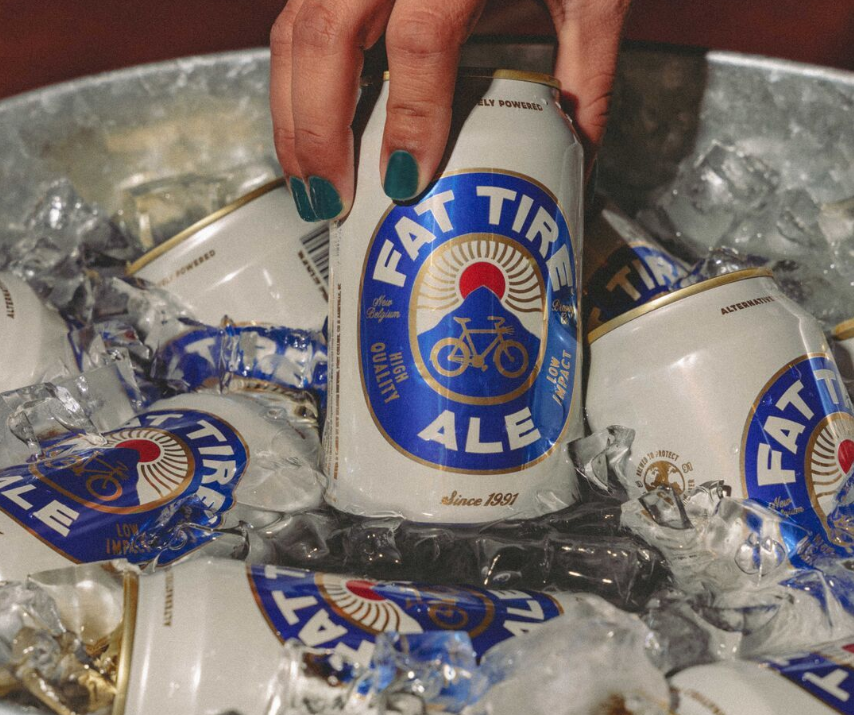
Ryan Pachmayer

Audio By Carbonatix
New Belgium is moving forward in an uncertain craft beer market with an aggressive boldness that would make most companies skittish. It’s gone all in on its market-leading Voodoo Ranger IPA brand, doubled down on environmental stewardship and, most recently, redesigned its flagship Fat Tire beer.
To understand these moves, and what lies ahead, you have to look back to the company’s original core values, which included a focus on sustainability and being a strong community partner.
New Belgium has never been a typical beer company, beginning with founders Kim Jordan and Jeff Lebesch finding inspiration to start the brand during a bike trip through Belgium. The characterization extends to company milestones, like its employees choosing to give up profit shares in the late ’90s in order to become the first wind-powered brewery. Another groundbreaking event was the turn-of-the-century launch of La Folie Sour Brown, along with New Belgium’s now-renowned sour beer program.
In many ways, New Belgium has always been set up for innovation and the ability to respond to an ever-changing market; its focus always skewed a bit from traditional offerings. The brewery likes to put its own twist on classic styles, from a honey-orange tripel to its Blue Paddle Pilsner, a beer that former longtime brewmaster Peter Bouckaert put his mark on. “We never really talk much about traditional beer, because it’s not what we’re making,” says current brewmaster Christian Holbrook, who has been with the company for two decades.
Company culture has been critical to New Belgium’s ability to adapt. Many in the beer community, including New Belgium employees, held their collective breath when a sale to Lion Little World Beverages, parent of the popular Kirin brand, was announced in 2019. But for the most part, not much appears to have changed post-sale.

Fat Tire’s old look is no more.
New Belgium Brewery
“Early on, [Lion] really latched onto our core values, with the understanding that they are going to be really important to protect,” says New Belgium Chief Marketing Officer Shaun Belongie, who joined the company the year before the sale.
“You kind of never know until you’re on the other side of it how true any of [these things are],” he adds. “And it certainly ended up playing out. There’s not a layer of bureaucracy on top of us now. Our CEO is still signing off on ideas, and we’re not having to go through multiple layers of people to make decisions.” This dynamic allows New Belgium to adjust on the fly.
Even the brewery’s name offers a hint of what to expect from the beer. Belgium is known for creative, innovative brewers that aren’t confined to as narrow a set of standards for beer styles as its European counterparts in countries such as Germany or the Czech Republic. Many American breweries have looked toward the inventiveness of Belgian brewing culture when creating new styles over the past few decades, and New Belgium was one of the first to do so. To name your company after such an imaginative brewing culture signals an intent to create original beers – and to not settle in one place for too long.
An exception to the consistent innovation was Fat Tire. While the recipe for the core brand largely stayed the same for years, there were notable tweaks, including a reduction of late aroma and flavor hops around the turn of the century and a 2018 recalibration that included the dropping of Victory malt and the aim for a cleaner beer overall. These changes went mostly unnoticed by typical customers.
But January brought the most drastic event in the history of Fat Tire, with a full rebrand focused on the brewery’s larger environmental initiatives, a clear difference in the color of the beer, and a big announcement of the changes.

The Voodoo Ranger IPA series has been a staple of growth for New Belgium.
New Belgium Brewing
Why change such a popular staple? In short, the market has changed. And while the Voodoo Ranger lineup is on fire, Fat Tire has decreased quite a bit in popularity in recent years. “It was about two years ago that we decided Fat Tire would become more of a pale beer,” says Holbrook. “Consumer studies pointed us toward making more significant changes to Fat Tire.”
Making the brand more approachable for a broader audience was a primary goal, Holbrook adds, along with an increase in drinkability. New Belgium seemingly attempted to walk a tightrope between making changes that will increase its appeal to today’s drinkers and not brewing a completely different beer under the same familiar name.
Just how different is this beer? Fat Tire has actually been transitioning to the new recipe for over six months, with the most noticeable shift being a paler hue. But in order to truly compare the new Fat Tire to the classic recipe, a drinker has to go beyond the color and really dive into the flavor.
The final beer is noticeably lighter on the palate, but it does retain the toasty and sweet malt flavors, the result of using the same malts as the old recipe (Munich and Crystal), just at a lower volume. The second biggest change is that the hop bitterness has been dialed back. The carbonation is high, the beer is clean and, along with being a bit lighter, it drinks a little drier than the old recipe. The term “crisp” may be a bit misleading – nobody will confuse this beer for a pilsner or a cream ale. Instead, Fat Tire remains the malt-forward beer it has always been, despite the fact that some miss the older version.
And while major market shifts can drive these types of decisions, the team at New Belgium originally pushed for changes in Fat Tire with the goal of making it a more sustainably produced beer, starting with the addition of raw barley, a malt that isn’t typically used in brewing and doesn’t require the energy-intensive kilning process that most other malts do.
It’s not often that a large company is willing to admit failure on a goal like that, especially an environmentally conscious brewery like New Belgium – but the team is transparent. “We added a small amount of raw barley [to Fat Tire],” says Belongie. “We ended up not being able to do as much with it as we thought we could, and some of that is related to the supply side of things.”

The new Fat Tire is a golden ale.
New Belgium/Instagram
This is the point where you realize that New Belgium could have just tweaked the beer in different ways to save costs on grains or other parts of the process, slapped a “50 percent more environmentally friendly” label on the can and called it a day.
But it didn’t. There was a clear goal to keep the soul of the beer close enough to the original. That’s what’s missing from a lot of the knee-jerk reactions, hot takes over the recipe change and nostalgic fawning. This is a similar beer, brewed by a similarly minded, post-sale brewery with many of the same people behind the curtain.
Another question that the change and the discussion surrounding it brings up is this: In 2023, does craft beer even need a gateway product? There are so many ways to enter craft beer today, from authentically made European-style lagers to fruited sours to funky saisons, whiskey- and chocolate-forward stouts, and every type of IPA under the sun.
Fat Tire was introduced in 1991, when there were only about 250 breweries in the United States. Almost thirty years later, the country is approaching 10,000 operating breweries. There are likely more craft beer options at a major local liquor store today than were available across the entire country when Fat Tire debuted.
Craft beer is, and has been, everywhere for some time now. Chances are an adult who doesn’t drink craft beer is at least aware of it, and most understand that it exists in many forms. Handing somebody a malty amber ale is not likely to open anyone’s mind to a new world like it did in the ’90s.
So, no: Craft beer does not need a gateway beer in 2023. But does it need this new version of Fat Tire? That’s for the customer to decide. And whether or not the change is embraced, you can be sure that New Belgium will be brewing up something new and different sooner than later.